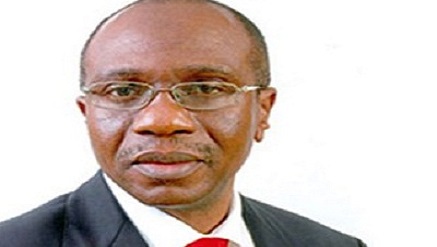E-Financial
CBN, States Sign MoU on MSMEs Fund

Central Bank of Nigeria (CBN) yesterday signed a memorandum of understanding (MoU) with the Executive Governors of Delta, Osun, Oyo, Akwa-Ibom and Bornu States among others on the operation and administration of the N220 billion Micro Small and Medium Enterprises Development (MSMEs) Fund which was launched last year.
It also emerged that the actual disbursement of the fund is expected to be performed by President Goodluck Jonathan during the forthcoming annual MSMEs conference schedule to hold in August.
Godwin Emefiele, governor of the apex bank, disclosed this in Abuja during the signing of a Memorandum of Understanding between the bank and governors from 11 states.
The MoU, signed at the apex bank’s headquarters had in attendance governors from Delta, Akwa Ibom, Osun, Oyo, Bayelsa, Gombe, Zamfara, Enugu, Ondo and Benue states.
The CBN governor said the flag off of the disbursement would be done by President Goodluck Jonathan, noting that the fund would be given to Nigerians at a single digit interest rate of nine per cent.
Emefiele said that based on the guidelines of the fund, each state of the federation would be able to access the sum of N2bn which would be administered through Micro Finance Banks.
The governor, who put the funding gap of the sector at about N9.6tn as at 2010 said, “As a country, we don’t have a choice than to support the youth by taking actions to engage their energy positively by creating jobs for them.
“We would work with you to ensure that it gets to the beneficiaries directly at a maximum rate of nine per cent, 60 per cent of this money will go to women
“The disbursement of the loan will kickoff in August and we want the President to personally kickstart the process in August.”
He said the CBN fund would focus on resolving challenges such as access to collateral and enterprise development support.
The governor said since the country has a large proportion of youths, there is an urgent need to engage their energy positively in productive sectors that would create jobs and reduce poverty.
This, he added, underscored the need for the apex bank, in pursuit of its developmental mandate to release the fund at a single digit interest rate for the development MSMEs.
Emefiele said as part of measures aimed at ensuring inclusive growth for the economy, 60 per cent representing N132bn out of the fund had been set aside for women.
He said, “We are starting with N220bn and I can assure you that once this amount is fully applied we would seize opportunity to increase it.
“But the important thing is that we are saying that the fund is going to be applied towards supporting the financing needs of our people a the lowest level of the pyramid at dingle it rate.
“We believe that if properly applied, what you will find is that it would see to the transformation and economic development of Nigeria and that is what is uppermost in our minds so even if we have to do more after this, it would be worth it.”
He assured that all the bottlenecks that may affect the implementation of the program would be addressed by the apex bank.
Godswill Akpabio, governor of Akwa Ibom State, commended the governor for the initiative, noting that a lot of lives would be transformed with the intervention fund.
He, however, said since the sector has the potential to create jobs, there is need for the bank to increase the accessible amount by each state from the current N2bn to between N3.5bn and N4bn.
He also requested that all bottlenecks that would hinder the successful disbursement of the fund be removed so that those who should benefit for the fund should not be excluded.
He said, “There is need to increase the amount because Nigerians are in a hurry owing to see a reduction in poverty and unemployment rate.
“We can start with N3.5bn or N4bn for each state so that we can make great impact with the sector in creating jobs
“We should also remove some of the impediments that will affect the disbursement of this fund.
The state can even guarantee this money so that it can quickly get to the beneficiaries. The experience in the past is that many intervention funds are not easily accessed owing to bureaucratic bottlenecks and this need to be addressed.”
E-Financial
CBN Expresses Concern Over Foreign Investments in Nigeria Fintechs

The Central Bank of Nigeria in its 2025 Fintech Policy Insight Report, has raised concern over Nigeria’s fintech sector heavily dependent on foreign investment, exposing it to swings in global markets.

The report said the sector has shown resilience despite global economic pressures, but warned that reliance on external capital leaves it vulnerable to market fluctuations.
It would be recalled that startups in the country raised $520m in equity funding in 2024, down from about $747m in 2019, when Nigeria captured roughly 37 per cent of all African startup investment.
This performance, amid significant global macroeconomic gyrations, underscores Nigeria’s position as a key hub for financial innovation. The sharp rise in interest rates in advanced economies during 2022 contributed to a slowdown in venture capital funding.
“These dynamics highlight the importance of developing domestic funding avenues, such as leveraging Nigeria’s capital markets, to reduce currency risk and sustain fintech growth,” the apex bank stated.
Olayemi Cardoso, CBN Governor, said Nigeria is undergoing a rapid and significant financial evolution. Over the past decade, the nation’s fintech landscape has grown from a handful of startups into one of Africa’s most vibrant innovation ecosystems.
“Even amid global economic headwinds, Nigerian fintech firms continued to attract investment and drive change. Today, with improved stability of our currency and domestic economy, it is clearer than ever that financial innovation can advance inclusion at scale,” the executive commented on the report.
In addition to funding, the central bank underscored Nigeria’s continued leadership in digital financial infrastructure. More than 25 per cent of all electronic transactions in Africa’s most populous nation are processed via real-time payment channels, with close to 11 billion transactions processed in 2024, up from five billion in 2022. The report described Nigeria’s instant payments platform, NIBSS NIP, as among the most mature and widely adopted globally.
The report also mentioned the need to strengthen system integrity and reputation, pointing to compliance reforms, anti-money laundering supervision, and consumer protection measures as key priorities for sustaining investor confidence.
By focusing on domestic funding, regulatory modernisation, and innovation infrastructure, the CBN aims to position Nigeria not only as a fintech front-runner but also as a rule-setter whose regulatory lessons are relevant to peer emerging and high-growth economies globally, the central bank said.
Stakeholders surveyed by the CBN also cited compliance costs as a significant challenge to innovation. According to the report, 87.5 per cent of respondents said that the cost of meeting regulatory and risk requirements significantly impacts their capacity to innovate, while delays in product approvals and regulatory timelines also remain major bottlenecks.
The report noted that 62.5 per cent of fintech firms plan to expand regionally, and there is strong support for regulatory pass-porting frameworks to enable compliant expansion into other African markets. However, the CBN warns that such cross-border growth requires a stable funding base and coordinated regulation.
E-Financial
UBA’s Easy and Instant Account Opening Thrills Returnee

After a few years abroad, I returned to Nigeria and faced a dilemma. Let me tell you all about it.

UBA
A few days ago, I was dragging my luggage through Murtala Muhammed International Airport. Everything felt bright and beautiful. Not necessarily in aesthetics, but in the vibrant colours, sounds, and energy all around. After three intensive years in the UK, I was finally back home. Ready for the hustle and bustle of Lagos life, and yes, the comfort of my parents’ home.
The plan was simple. Settle down and get my life on track. I’d sorted the job, and I had my person. But then came my dilemma. Money!. This doesn’t mean I was short of it or had too much of it. The real issue is where to actually keep and manage it in this country with daily dramatic happenings. With just two weeks left before I resumed at my new workplace, I had no time for long queues, endless paperwork, or the classic “Nigeria bank stress.” So, I needed an account, and I needed it fast.
So I turned to my best friend, Google, and typed, “Instant account opening in Nigeria.”
In less than a second, I was redirected to the United Bank for Africa instant account opening portal. A few taps later, and I had a fully functional account. Just like that. I could receive my funds, transfer my funds, and start building my financial life here again.
In less than a second, I was redirected to the United Bank for Africa instant account opening portal. A few taps later, and I had a fully functional account. Just like that. I could receive my funds, transfer my funds, and start building my financial life here again. Talk about ease, and this beautiful experience truly exemplified that definition
I was genuinely amazed. It felt too easy, almost suspiciously easy. But it was real, I mean, really soft like they were just thinking all about me while developing this new feature.
If you’re like me and pressed for time, avoiding unnecessary stress, or just ready to sort your finances without the hassle, consider this your sign.
UBA’s instant account opening is a game-changer. No queues to cut into your precious time. Just you and your phone, minutes away from being banked.
Get started here: https://aop.ubagroup.com
Trust me, if I could do it between unpacking and settling in, you can do it too. Your future self will thank you.
E-Financial
BOI Secures CBN Nod for Sharia Banking, Unlocks Ethical Funding Boom

Bank of Industry (BOI) has received Central Bank of Nigeria (CBN) approval to launch a Non-Interest Banking (NIB) Window, expanding ethical financing for underserved businesses nationwide.

BOI
The move positions BOI to mobilise Sharia-compliant funds, finance assets and raw materials without interest, and target MSMEs plus high-impact sectors previously sidelined by conventional loans.
Divisional Head of Public Relations, Theodora Amechi, said the window aligns BOI with social goals, boosting real economy support and sustainable industrial growth.
MD/CEO Dr. Olasupo Olusi hailed it as a “pivotal moment,” enabling the bank to serve faith-sensitive enterprises shunning riba-based loans.
Analysts see it as CBN’s vote of confidence in BOI’s governance, set to spur innovation and inclusive financing for Nigeria’s ethical business segments.
Established in 1959 as Nigeria’s top Development Finance Institution, BOI now strengthens its drive for broad-based economic transformation.

 General News3 days ago
General News3 days agoGlobacom Donates ₦1Bn to Lagos State Security Trust Fund

 Telecom3 days ago
Telecom3 days agoAirtel Nigeria Commits to Upgrade of its Network Infrastructure for Improved Quality of Service

 E-Business3 days ago
E-Business3 days agoPwC Reveals AI Scaling Gap Slows Africa’s Digital Transformation

 E-Financial3 days ago
E-Financial3 days agoEcobank Profit Jumps 29 Percent to N950Bn

 News3 days ago
News3 days agoCIoD, NIPSS Partner to Deepen Governance, Leadership Standards

 News3 days ago
News3 days agoNRS Chairman Outlines Ways Nigeria can Move from Potential to Economic Prosperity

 General News3 days ago
General News3 days agoWIEG to host Nigeria’s first International Investment Summit in Lagos

 News3 days ago
News3 days agoOrya, Ex-NEXIM MD Jailed 490 Years for N2.4Bn Fraud



























